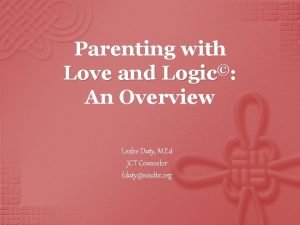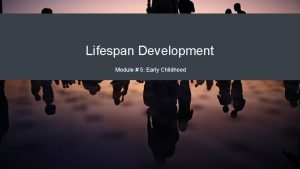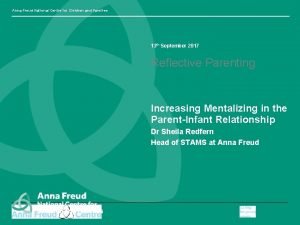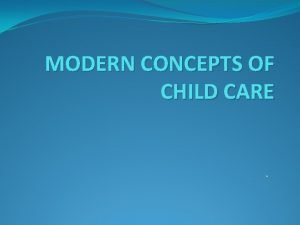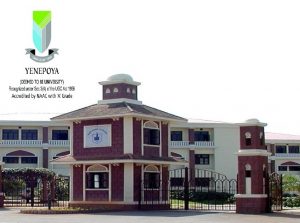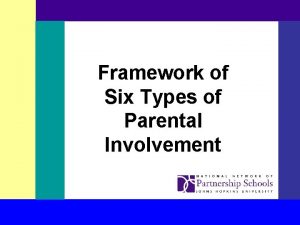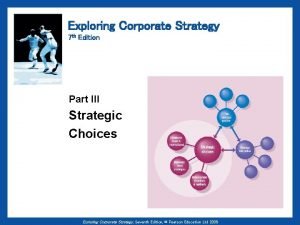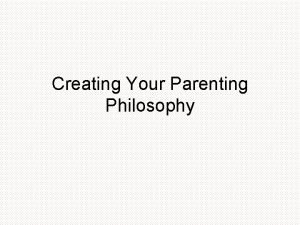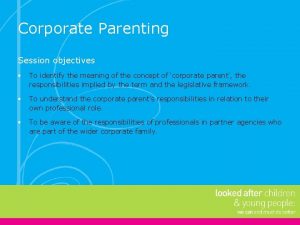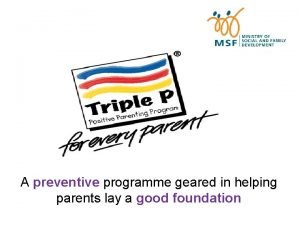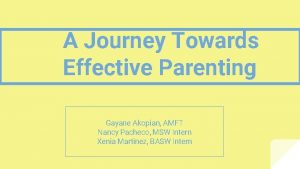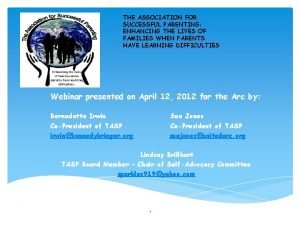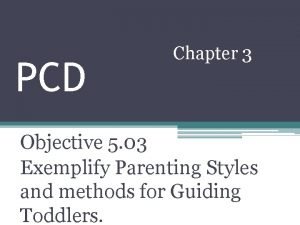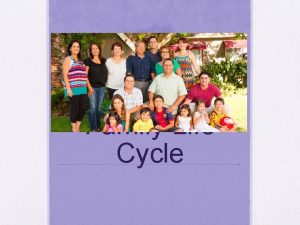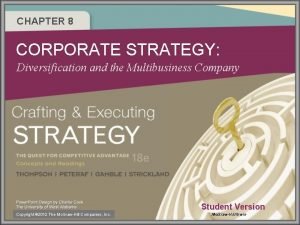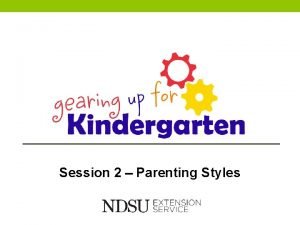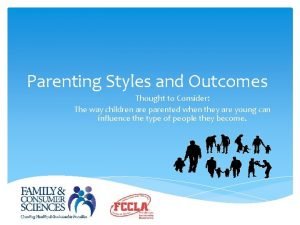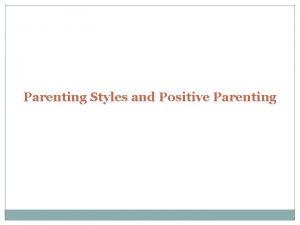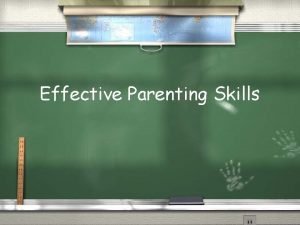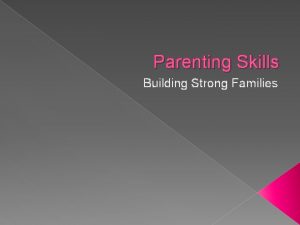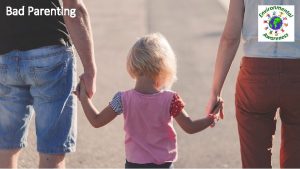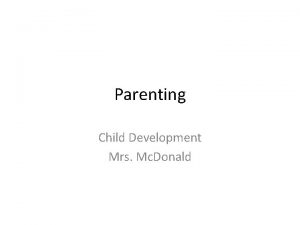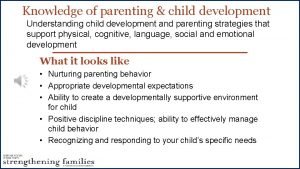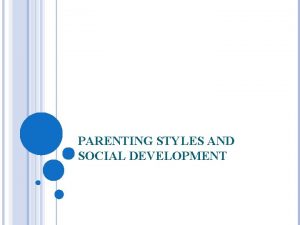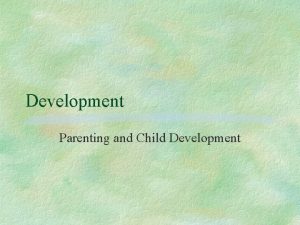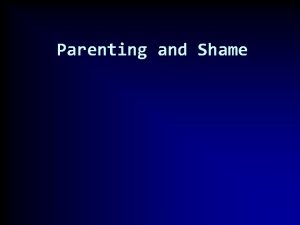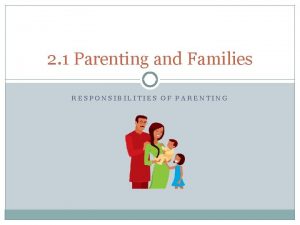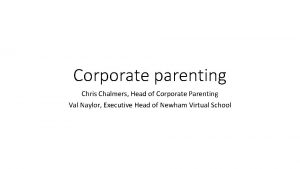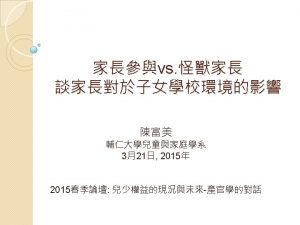APPLYING CHILD DEVELOPMENT CONCEPTS Parenting and Child Development


























- Slides: 26

APPLYING CHILD DEVELOPMENT CONCEPTS Parenting and Child Development Unit 4 Mrs. K. Harris

Objectives 1. 2. 3. 4. 5. 6. 7. 8. 9. List the basic needs of children. Match major theorists in child development to their theories. Profile major theorists in child development. Define the developmental stages from infancy to school-age. Distinguish among emotional, intellectual, physical and social development. Answer questions about the importance of play in child development. Discuss the roles of heredity and environment in child development Discuss the impact of technology on children. Evaluate the impact of technology on children.

Basic Needs of Children Term to Know Sensory exploration-exploration of the physical and social environment by suing the senses. • • • Clothing Exercise Food Hygiene Love Medical Care • Sensory Exploration o • • • Such as look at, touch, listen to, and play with objects Safety Shelter Sleep

Basic Needs of Children Crying is the only way for babies to communicate. • Go to a crying baby immediately so the child will learn to feel secure and cared for. • Newborns can NOT be spoiled by receiving attention when they are in need. • Sleep • Babies sleep a lot to help themselves recover the energy expended during eating and crying

Theorists in Child Development Term to Know • Theory-the idea which may be based on scientific evidence, but is not proven fact Albert Bandura • Social learning theorist • Based on the belief that children acquire most of their social concepts from those whom they observe in the course of daily life • Developed the modeling concept; learning and teaching by example

Theorists in Child Development Erik Erickson Psychosocial theorist • Based on the development of the individual within the social setting of the human race • Feels personality develops continuously throughout the life cycle • Identified eight stages throughout the life cycle • Views each stage as a conflict that plays an equally important part in social development •

Theorists in Child Development Jean Piaget Cognitive or developmental theorist • Believed that intellectual development occurs in a continuous sequence of four stages, building upon each other • Considered development based on the way a person progresses in thinking skills from infancy to early adolescence •

Developmental Stages Term to Know • Developmental stages-changes that occur in a series of sequenced steps, each one building on what was previously learned. • Each child is a unique person and progresses through the developmental stages at his or her own rate. • The following descriptions are provided as a general guideline for understanding child development.

Developmental Stages Infant First stage of development • Birth to approximately one year of age • Depends on adults for care and needs • Toddler One to two year old child • Child learns to walk with short unsteady steps • Needs security of parents being close by, but wants to accomplish goals independently • Stage is characterized by curiosity and assertiveness •

Developmental Stages Preschool • Between three and five years old • Rapidly develop motor, intellectual, and social skills • Language skills are developing • Interested in doing things for themselves and others • Support and time from caring adult are needed to learn, grow, and deal with changes

Developmental Stages School-age • Six to twelve years old • Begin with many babyish characteristics from toddler and preschool years • Begin to adjust to the social world out side of home • Emotions gradually stabilize as the child matures and adjusts to school

Emotional, Intellectual, Physical, and Social Development Term to Know Developmental stages-changes that occur in a series of sequenced steps, each one building on what was previously learned. It is important to realize that children develop in a combination of areas which often overlap.

Emotional, Intellectual, Physical, and Social Development Emotional development • Ability to respond with feelings • Apply problem solving techniques • Make decisions • Gain degrees of independence

Emotional, Intellectual, Physical, and Social Development Intellectual Development • Ability to process information • Learn concepts • Express creativity • Learn through senses • Learn and use language skills

Emotional, Intellectual, Physical, and Social Development Physical Development • Development of motor skills • Using proper health practices • Grow in size, proportion, and muscle coordination

Emotional, Intellectual, Physical, and Social Development • Ability to demonstrate responsibilities • Interact with others • Develop personality • Develop self-esteem

Importance of Play • • Children’s play is the “work” that children do Play is the main way basic skills are strengthened Play occurs at every age, children spend most of their waking hours playing Four basic skills learned: Physical o Intellectual o Emotionally o Socially o

Importance of Play Physically • Development of large muscle groups like arms and legs • Three types of physical play: Sensory motor play-senses and motor abilities used together o Mastery play-helps to master new physical skills o Active play (rough housing)-mimic aggression, but is characterized by smiles, laughter, and giggles o

Importance of Play Intellectually • Books, songs, toys, and sorting • Needs to have availability of appropriate playthings • Amount of time a child is read to, can predict later intellectual cognitive competence and verbalization skills

Importance of Play Emotionally • Helps children find ways to work through life’s problems and challenges Socially • Playing alone or with others • Learn sharing, cooperation, and taking turns • Active and quiet conversational play, helps children learn about the social world around them

Roles of Heredity and Environment Terms to Know Heredity- the set of plans made up by genetic structure Environment-everything that surrounds people, including physical, social, and cultural aspects. Nature (Heredity) Vs. Nurture (Environment) controversy is a dispute in the study of human development

Roles of Heredity and Environment � Nature vs. Nurture � Nature-Theorists argue that genetic factors Influence individual traits and characteristics � Nurture-Theorists argue that personal experience influences individual traits and characteristics � Most scientists agree that both are important � Heredity and environment are crucial to individual development

Technology and Children � Question � What � is the impact of technology on children? Technological advancements affecting families: � Medicine/Health � Manufacturing � Transportation � Communications � Etc.

Technology and Children � � � Positive or negative depending on how it is USED and PERCEIVED Can be both a liability or an asset to a child’s learning and development Examples of children’s technology: � TV � Video Games � Internet � Toys

Technology and Children � Positive � Can make learning fun and easy � Exposure to new information � Discovery oriented experiences � Negative � Can take time away from active play Active play is more likely to promote creativity, verbal and social skills, and independence Could lead to obesity and decreased physicality � May promote violence which causes them to be more aggressive � Commercial influence

THE END
 Applying student development theory
Applying student development theory Parenting with love and logic summary
Parenting with love and logic summary Lemasters and defrain
Lemasters and defrain Freud and parenting
Freud and parenting Concept of child health
Concept of child health Modern concept of pediatrics
Modern concept of pediatrics 4 types of parenting styles
4 types of parenting styles 4 parenting styles
4 parenting styles Laissez faire parenting
Laissez faire parenting Guidance vs punishment
Guidance vs punishment Theoretical framework about parental involvement
Theoretical framework about parental involvement Parenting matrix
Parenting matrix Parenting philosophy
Parenting philosophy Corporate parenting meaning
Corporate parenting meaning 4 levels of parenting
4 levels of parenting Parenting is a journey
Parenting is a journey Individualistic parenting
Individualistic parenting The association for successful parenting
The association for successful parenting Parenting philosophy quiz
Parenting philosophy quiz Parenting assessment manual
Parenting assessment manual Mate acquisition meaning
Mate acquisition meaning Expanding stage of family life cycle
Expanding stage of family life cycle A strategy of diversifying into unrelated businesses
A strategy of diversifying into unrelated businesses Objectives of parenting styles
Objectives of parenting styles Trauma informed parenting discipline
Trauma informed parenting discipline Permissive parenting
Permissive parenting Galinsky's stages of parenting
Galinsky's stages of parenting

